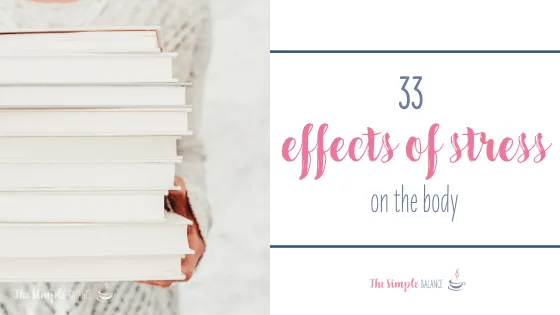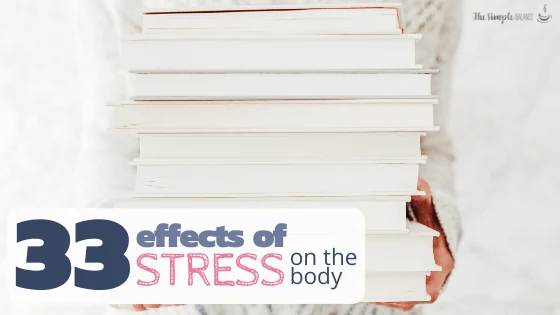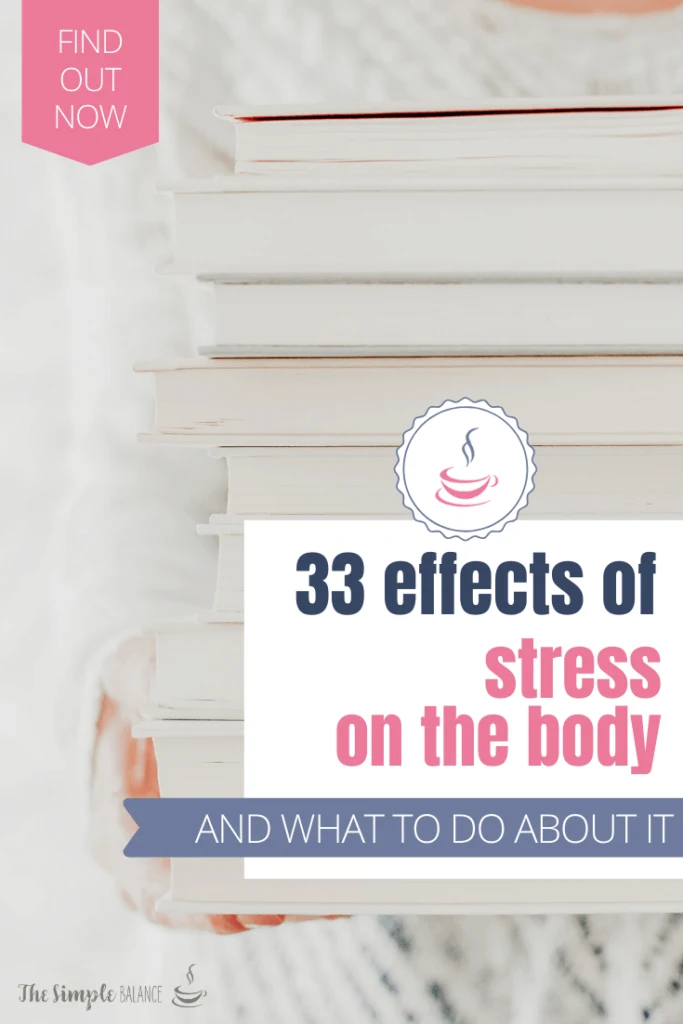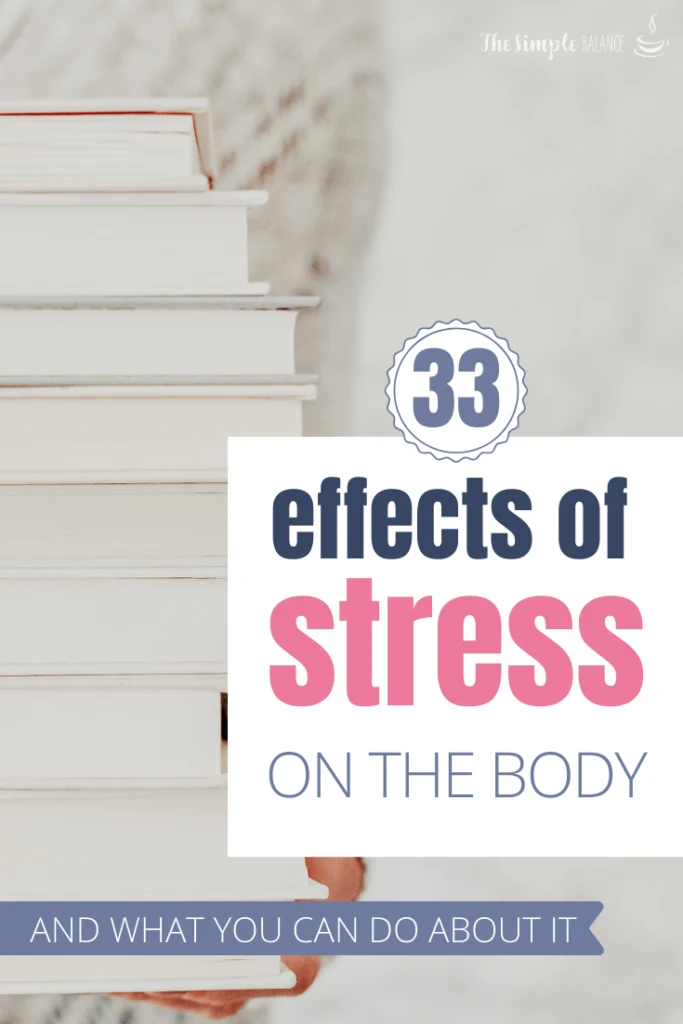Is it possible you might already experience the physical effects of stress on the body without even knowing? In this article, you’ll discover the symptoms of too much stress – and what you can do about it!

Everybody talks about stress these days. And that we’re having too much of it. But are we just being fussy? Maybe we’ve become over-sensitive. And unable to cope to like a normal person.
If you have a chat with your grandma about her childhood, you might be inclined to think that. After all, our life is a dream in comparison, right?!
Effects of stress on the body – just a hoax?
Let’s get this out of the way: Stress is a completely natural part of life – both for humans and any other living being.
Every time we have to respond to a new and unknown situation, our body experiences stress and kicks off a powerful physical response.
That means the release of a bunch of hormones to be physically and mentally ready to act quickly. The effects look something like this:
- rapid & shallow breathing
- fast heartbeat
- tense muscles
- extra energy kick for muscles
- primal instincts take over
- reason & logical thinking go out the window
- anything that’s unnecessary to the immediate survival hits the pause button (think: immune system, libido, digestion)
Stress and our ancestors
I love the vivid example of a natural stress reaction: our ancestors and the saber-toothed tiger. Because this is exactly what the physical stress response evolved for:
To escape the dangerous saber-toothed tiger, all resources must focus on “fight or flight“. Or otherwise known as the stress response.
Effects of stress on the body caused by a saber-toothed tiger
Facing a predator, you have to act without even the slightest hesitation. Otherwise, you’d be lunch. And that is why primal instincts take over to ensure survival.
On top of that, everything that’s not crucial for survival instantly drops low on the body’s list of priorities:
- Immune system? Well, let’s see if we’ll still need that in an hour.
- Digestion? We’ll get back to that once we know we are not being digested ourselves.
- Libido? Haha, nice one… – We have way more pressing matters to worry about right now.
Once the tiger is sizzling over the fire, all systems go back to normal. The entire body relaxes. And with solid recovery, it gets stronger for the next tiger-based encounter.
Stress in modern life
As entertaining as this little story from the days of yore may be – it also helps identify something more contemporary: The effects of stress on the body in the digital age.
You see, the human body still responds to stress as if we were facing a dangerous predator.
And it doesn’t help that our brains make little difference between real or imagined. That means it responds with a fight or flight mode as soon as it perceives any kind of danger. Consciously or subconsciously.
I know there’s a good chance you’ve never actually encountered a saber-toothed tiger. But maybe the following still sounds familiar, when it comes to a stressful situation:
- your heart beats louder and faster
- your mouth feels dry
- breathing is fast and shallow
- and your muscles hum with tension and energy
Also, it doesn’t matter whether it’s actually a matter of survival like losing your income. It could just be an unexpectedly large bill or a tense relationship.
Your perception determines the effects of stress on your body
You can experience stress in two different ways. The same situation can be stressful for some and inspiring for others.
If you know you are capable to handle the challenge, then you’ll simply focus and solve the problem. The initial tension then dissolves as soon as you know: I’ve got this.
But what if you feel overwhelmed? And you don’t know how to deal with a difficult situation?
That’s when the stress response keeps running your body until you’re able to relax again. If that doesn’t happen – because the “threatening” situation is permanent – then the natural short-term response turns into chronic stress.

Chronic stress and its symptoms
Looking at the effects of stress on the body during fight or flight leaves clues about the potential consequences of frequent stress.
To see if you are under too much pressure, let’s go into a little more detail here:
Physical effects of stress include:
- cardiovascular issues such as high blood pressure or arrhythmia
- headaches
- muscle pain & tension, particularly in your back or neck
- tinnitus & sudden hearing loss
- gastric ulcers & indigestion
- elevated blood sugar level
- menstrual problems, infertility & loss of libido
- higher sensitivity for pain
- frequent colds or infections
- troubled sleeping (hard time falling asleep or sleeping through the night)
Mental symptoms of too much stress include:
- restlessness
- difficulty to focus
- memory problems
- depression
- inability to relax and unwind
- listlessness
- irritation & nervousness
- hopelessness
Possible long-term consequences of chronic stress:
- burnout with partial or total inability to cope with everyday life
- heart attack & cerebral infarction
- extra weight
- diabetes
- substance abuse (alcohol, drugs, tobacco)
- strained or broken relationships
- gastrointestinal disorders
- depression
- tumors due to a compromised immune system
Did you detect any effects of stress on the body?
Let me stress this (pun totally intended… 😉 ): The last thing I mean to do is scare you. Please keep in mind that for serious illnesses, stress is rarely the single cause.
But it does help to remember that self-care cannot be a luxury. It’s not something that can wait until you’ve got the rest of your life figured out.
Because there are real effects of stress on the body.
You may think that stress is mainly a matter of the mind, but it always involves your entire body. And that means, there are physical and mental consequences if your body doesn’t get the rest it needs.
So what to do?
Help with too much stress
If you discovered some of the effects of stress on the body in your own life, then these are the next steps:
- Be sure to discuss your symptoms with a doctor!
- Consider working with a therapist, psychologist or coach.
- Make self-care a top priority in your daily life and integrate as much relaxation as possible.
Self-care to reduce chronic stress
It may take some time before you make it to the doctor or find a good therapist. But you can get started right away by looking into practical ways to incorporate self-care in your daily life. To help with that, I’ve written other posts on the topic of stress:
Get started today:
37 easy self-care tips for busy days
My number one self-care tip for depression & anxiety
The 5 pillars of unselfish self-love
No, we’re not being overly sensitive. And stress isn’t a hoax or an excuse. It’s real and it causes damage in the long run.
So, use this knowledge to start a less stressful life right now.
Because nobody should go through life constantly stressed out and getting sick in the process.
Your life is simply too valuable for that.
Ready to get more balance into your life? Sign up for my newsletter and gain access to my soon-to-be growing VIP area!




